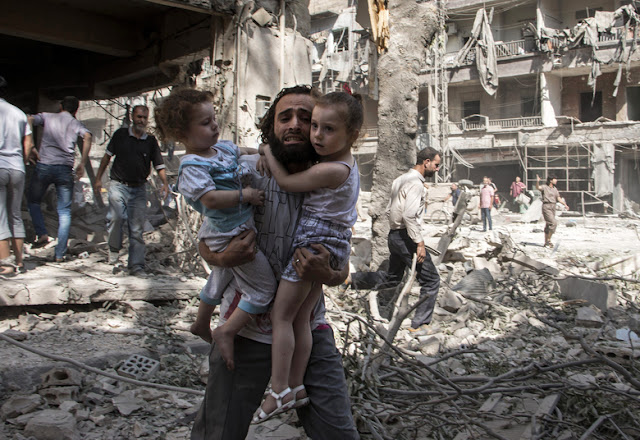Although there have been clear advances as the ceasefire or reverse jihadist forces, the conflict is far from resolved. The Syrian exodus has worsened and the differences between the contenders remain abysmal. The Syrian war has entered a phase of no return. Five years after the convening of the first demonstrations against Bashar al-Assad, the situation is out of control, as evidenced by the magnitude of the tragedy: five million refugees, seven million displaced and a range of deaths of between 300,000 and 470,000 according to different estimates. Most worrisome is that there is no reason to believe that the storm will abate in the short term. Despite the fragile ceasefire reached it could invite us to think otherwise, contending approaches remain entirely irreconcilable.
Western countries have reacted late and wrong to this crisis. Only when they saw the wolf ears with the Jihadist attacks in Paris and the arrival of hundreds of thousands of refugees into its territory, they came out of his reverie and activated diplomatic channels. One day after the slaughter in the French capital, the International Action Group for Syria stressed "the urgent need to end the suffering of the Syrian people, the destruction of the country, to the destabilization of the region and the increased number of terrorists involved in military actions. " The resolution 2254 of the Security Council, adopted on December 23, raised a roadmap to try to close the vicious circle in which we find: a transition process and a ceasefire that should be done simultaneously in time. However, this proposal seems unrealistic, since it is based on the establishment of a national unity government with executive powers within six months and the holding of free elections under the supervision of the United Nations in a year and a half Nations, unviable goals. According to the resolution, all parties to the negotiations, which are expressly excluded jihadist groups, should commit to preserve Syria's territorial unity and the secular nature of the system.
This is similar to the proposed formula in Geneva in 2012, but the situation on the ground has changed dramatically. The regime is in a strong position after the Russian intervention which has enabled it to recover some lost ground. When the initiative was launched in the Al-Nusra Front, Syrian branch of Al Qaeda, was irrelevant and was not even the self-styled Islamic State, which now dominates the basin of the Euphrates. The same can be said of Popular Protection Units, which control the Syrian Kurdistan, and which have been inexplicably excluded from negotiations.
Assad is seen as a lesser evil, when it is responsible for most civilian casualties
The resolution 2.254 commitment to constructive ambiguity in regard to the future of El Asad. While much of the international community considered the main responsible for war crimes and crimes against humanity committed by its army, Russia and Iran, its main allies, continue to opt for its maintenance in office, they consider vital to preserve their regional interests. In recent months, Western countries have been modulating his speech and now admit that holds the presidency during the transition phase. Some even begin to consider him as a lesser evil before the advance of the Islamic State, which is a real blunder if we consider that the regime is responsible for most civilian casualties, many of them caused by explosive barrels launched on densely populated areas. Various human rights organizations have repeatedly denounced during these five years, extrajudicial executions, enforced disappearances and widespread use of torture in Syrian prisons.
Faced with the insurmountable obstacle, in other areas other advances appreciate that. Probably the most hopeful is the fragile ceasefire started on 27 February. Despite the usual defaults, the fact is that the fighting and bombing have been reduced drastically, which could result in a reduction in the number of victims and the progress of negotiations in Geneva which, by the way, to far it has been nothing more than a dialogue of the deaf.
Another positive aspect is the access of humanitarian organizations to various embattled localities (especially by the regime and jihadi groups) in which 400,000 people live badly. Donors have already entered Madaya populations, just 45 kilometers from Damascus, where they have met and fifty Dantesque scenes of deaths from malnutrition. However there is still a long way to go, since in 2015 the United Nations could only offer medical aid to 3.5% of the population under siege and provide food to 0.7%. All this despite the fact that Article 8 of the Rome Statute considered a war crime "doing Intentionally using starvation of civilians as a method of warfare by depriving them of objects indispensable to their survival, including willfully impeding supplies relief in accordance with the Geneva Conventions ".
Western countries continue in the short term and have not drawn lessons from his disastrous management. Beyond these limited progress, the main concern is that the differences between the contenders remain abysmal and nothing seems willing to submit draft concessions. The terrorist Asad continues deeming all who oppose his permanence in power and blood and fire fighting them. The heterogeneous opposition, grouped in the Alto Negotiating Committee sponsored by Saudi Arabia, are economically dependent on the oil monarchies of the Persian Gulf, much more concerned about the growing power of Iran in the Middle East that the future of the Syrian population.
Western countries, meanwhile, continue to be guided by short-termism and seem to have learned any lesson from his disastrous management of the Syrian crisis. If last year the priority seemed to be fighting the Islamic State, today especially concerned about the arrival of hundreds of thousands refugees to Europe. The future of the Asad is still considered a minor issue when in fact represents the Gordian knot of the problem. If there have been clear advances in the fight against the jihadists, the Syrian exodus instead has worsened as a result of the intensification of the bombing of the civilian population. The indispensable condition to stop it through the success of the Geneva talks and the expulsion of the jihadist armies, which today no longer political fiction.








0 komentar:
Post a Comment